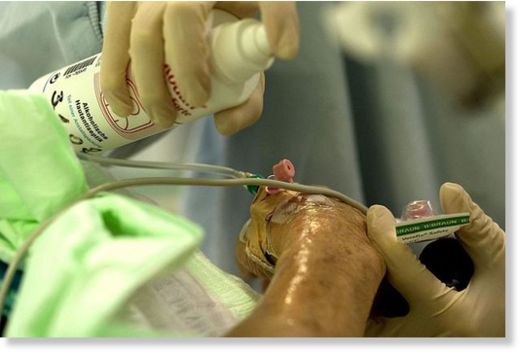
The rise of untreatable bacteria threatens an "unthinkable scenario" where minor infections could once again kill, the prime minister told The Times in a warning about what he described as one of the biggest health threats facing the world.
Tens of thousands of people are already dying of infections that have evolved resistance to common treatments and the World Health Organisation has warned that routine operations and minor scratches could become fatal if nothing is done.
Mr Cameron has become the first world leader to speak out about the threat, signalling escalating global concern at the highest level.
He believes that he has the agreement of President Obama and Angela Merkel for co-ordinated action to find new drugs after raising the issue with them privately at a G7 summit last month.
"This is not some distant threat but something happening right now," Mr Cameron said. "If we fail to act, we are looking at an almost unthinkable scenario where antibiotics no longer work and we are cast back into the dark ages of medicine where treatable infections and injuries will kill once again.
"That simply cannot be allowed to happened and I want to see a stronger, more coherent global response."
Jim O'Neill, the former chief economist at Goldman Sachs, will lead an international group of experts aiming to spur the development of a "new generation of antibiotics".
Mr O'Neill has been asked to consider how governments would pay pharmaceutical companies to produce drugs even if they were rarely used, as well as how poorer countries can be encouraged to improve control of existing antibiotics.
Only five new types of antibiotics have been introduced since the 1960s and the supply of newly-developed drugs is dwindling as companies see little profit in working on treatments designed only to be used as a last resort.
Appeals to doctors and patients to avoid antibiotics for sniffles and sore throats are no longer considered to be enough.
Professor Dame Sally Davies, the chief medical officer, has pressed Mr Cameron to launch global efforts to find new drugs, without which swathes of modern medicine, from hip replacements to chemotherapy, could become impossible.
"I've been listening to the scientific advice that I get, and the network of advisers we have are all saying this is one of the most serious health problems the world faces," Mr Cameron said. "For many of us we only know a world where infections or sicknesses can be quickly remedied by a visit to the doctor and a course of antibiotics. This great British discovery has kept our families safe for decades, while saving billions of lives around the world. But that protection is at risk as never before. Resistance to antibiotics is now a very real and worrying threat."
After success in persuading world leaders to commit to stepping up research into dementia at a special G7 summit last year, Mr Cameron believes similar progress can made on finding new antibiotics, as well as fallback treatments for parasitic and viral diseases such as malaria and HIV, which are also showing signs of resistance to drugs.
The prime minister added: "When we've had these problems in the past, whether it is how we tackle HIV and Aids, how it is possible to lead the world and get rid of diseases like polio, Britain has taken a lead and I think it is right we take a lead again."
Professor Laura Piddock, director of the campaign group Antibiotic Action, said it was "hugely important that the UK was taking a leadership role on this issue" and urged politicians not to lose interest in the hard slog of finding solutions.
The initial £500,000 cost of the work will be funded by the Wellcome Trust, which said only top-level commitment could produce the same progress seen in recent decades on Aids treatment or global vaccination.
Jeremy Farrar, the charity's director, said: "Drug-resistant bacteria, viruses and parasites are driving a global health crisis. This threatens not only our ability to treat deadly infections, but almost every aspect of modern medicine: from cancer treatment to caesarean sections, therapies that save thousands of lives every day rely on antibiotics that could soon be lost."
Malaria Emerging resistance is not confined to bacteria. Malarial parasites are becoming resistant to standard treatment in Cambodia, Burma, Thailand and Vietnam.



All these folks can think of is: design new drugs! What about taking antibiotics out of the food chain? What about putting an end to feeding antibiotics to *all* the chickens, cattle, dairy cows, and pigs in the industrialized food system? Perhaps that has *just a little* to do with the development of resistance to antibiotics!